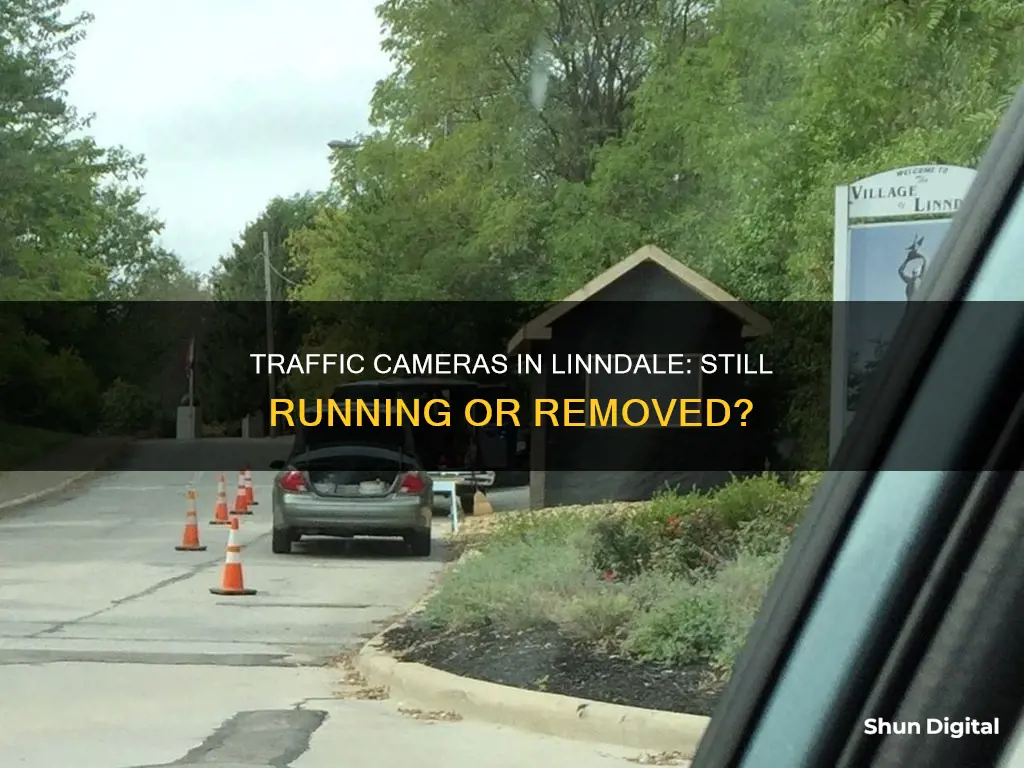
Linndale, Ohio, is a village with a population of around 108 people as of the 2020 census. It has gained a reputation as a speed trap, with a large number of traffic cameras installed, particularly on Memphis Avenue, the village's most heavily travelled non-interstate road. These cameras have generated significant revenue for the village, with millions of dollars collected annually from speeding tickets. However, there has been a pushback against these practices, with state legislators proposing bills to restrict the use of speed cameras and limit the number of tickets issued per resident. The village has also faced criticism for the accuracy of its cameras and the fairness of its ticketing practices.
What You'll Learn
- Linndale's speed cameras are the most notorious in Northeast Ohio
- Millions of dollars in fines are collected annually by Linndale
- People are questioning whether they need to pay the fines
- Linndale's Mayor has refused to answer questions about the traffic cameras
- Ohio lawmakers are pushing to shut down the traffic cameras

Linndale's speed cameras are the most notorious in Northeast Ohio
Linndale, the most notorious town in Northeast Ohio for its speed cameras, has been issuing tickets worth millions of dollars in fines from drivers. The village, with a population of 160 people, has collected $2.3 million from traffic camera fines alone. This has led to a negative perception of the town as being focused on revenue generation rather than public safety.
The speed cameras in Linndale are strategically placed in a tricky spot on an underpass connecting Linndale to the neighboring Brooklyn. The speed limit on this stretch of road suddenly drops from 35 mph to 25 mph, catching many drivers off guard and resulting in hefty fines. The revenue from these tickets has become a significant source of income for the village, contributing to its annual budget of about $2.7 million.
In response to the growing number of complaints and the negative impact on its reputation, Linndale has taken some steps to address the issue. The village hired Richard Neff, a former assistant Cuyahoga County prosecutor, to hear appeals from motorists who received tickets. Neff has been known to reduce fines or even tear up tickets for those who show up for the hearings. However, the process is not very convenient for most people, as the hearings are held during work hours on Thursdays.
Despite these efforts, the controversy surrounding Linndale's speed cameras continues. State Representative Tom Patton has proposed new laws restricting small towns from relying heavily on revenue from speeding tickets. He has also started drafting legislation specifically targeting Linndale to put a stop to their excessive use of speed cameras.
The excessive use of speed cameras in Linndale has not only frustrated drivers but also caught the attention of lawmakers. The village's heavy reliance on revenue from traffic fines has led to a negative reputation and efforts to curtail their ability to issue tickets. Linndale's speed cameras have become a symbol of the tensions between small towns' financial needs and the fairness of traffic enforcement in Northeast Ohio.
The Evolution of Colored Cameras: A Historical Perspective
You may want to see also

Millions of dollars in fines are collected annually by Linndale
Linndale, a village in Ohio, has gained a reputation for being a speed trap. The village has a population of 108 people and is landlocked, surrounded by the city of Cleveland and the suburb of Brooklyn. Linndale's small size and low population have led to criticism of its use of traffic cameras and the resulting fines.
The village has installed speed cameras on Memphis Avenue, the most heavily travelled non-interstate road in the area. These cameras have generated significant revenue for Linndale, with millions of dollars collected annually in fines. In just seven months in 2021, Linndale collected over $1.3 million in civil fines from speed cameras. This amount is more than double the number of camera tickets issued in Parma, a much larger city.
The use of traffic cameras in Linndale has been controversial. State Representative Tom Patton has criticised the practice, calling it a "cash register" for the village rather than a legitimate law enforcement or public safety measure. He has proposed legislation to restrict the use of speed cameras in small towns and limit the number of tickets per resident.
The high volume of traffic cases and fines has also raised questions about how Linndale spends the revenue generated from these citations. With a population of 160 people, Linndale has an annual budget of about $2.7 million and a police force of 10 officers. In comparison, the nearby town of Rochester, with a similar population, has an annual budget of around $65,000 and does not use traffic cameras or have its own police force.
The traffic cameras in Linndale have also been criticised for being placed in tricky spots, such as an underpass connecting Linndale to neighbouring Brooklyn, where the speed limit drops from 35 to 25 miles per hour. This sudden change in speed limits has resulted in many drivers being caught unaware and receiving tickets.
While some drivers choose to ignore the tickets, others have sought to contest them. Linndale has appointed a hearing officer, Richard Neff, to handle appeals. Neff has been known to reduce fines or tear up tickets for motorists who show up for the hearings and present their cases.
Glo Bus Camera Game: Strategies for Focused Success
You may want to see also

People are questioning whether they need to pay the fines
Linndale, Ohio, is a village with a population of 108, according to the 2020 census. It has gained notoriety for its extensive use of traffic cameras, which have generated millions of dollars in fines for the village.
The use of these traffic cameras has been a controversial issue, with many people questioning the legitimacy of the fines they receive. Some have chosen to ignore the tickets, while others have paid up to avoid potential consequences. However, as the village has started using a collection agency to pursue unpaid fines, more people are questioning whether they need to pay these fines at all.
The controversy surrounding Linndale's traffic cameras stems from several factors. Firstly, the village has a history of relying heavily on revenue from traffic fines, with a significant portion of its budget coming from this source. This has led to accusations of the village operating as a “speed trap," with an excessive number of police officers for its small population.
Secondly, there have been concerns about the accuracy and fairness of the traffic cameras. Some drivers have received tickets even when they believe they were following the speed limit, and there have been instances of tickets being issued to the wrong drivers. This has understandably caused frustration and skepticism about the reliability of the system.
Additionally, the process of challenging a ticket can be cumbersome and inconvenient, as hearings are held during work hours, making it difficult for people with day jobs to attend. While the village has appointed a hearing officer, Richard Neff, who has been known to reduce fines or dismiss tickets for those who show up, the overall system still lacks transparency and clarity.
With the recent involvement of a collection agency, people are even more hesitant to pay the fines. Some worry that ignoring the collection agency's demands could lead to legal repercussions or damage to their credit score. However, it is unclear how aggressively the village will pursue these unpaid fines, especially considering the high volume of tickets that go unpaid.
In conclusion, the controversy surrounding Linndale's traffic cameras and the resulting fines has led to widespread questioning of their legitimacy. The village's heavy reliance on traffic fine revenue, the accuracy of the cameras, and the challenging appeals process have all contributed to the skepticism and frustration among those receiving these fines. As the village continues to navigate financial constraints and public scrutiny, it remains to be seen how they will address these concerns and whether drivers will continue to be expected to pay these fines.
Dash Cam Absence in New Cars: Why the Omission?
You may want to see also

Linndale's Mayor has refused to answer questions about the traffic cameras
Linndale, Ohio, is a village with a population of 108, according to the 2020 census. It has a reputation for being a speed trap, with traffic enforcement providing 80% of its $1 million annual budget. In 2012, the state of Ohio dissolved Linndale's Mayor's Court, which had handled traffic cases. To compensate for the loss of revenue, Linndale installed speed cameras on Memphis Avenue, the village's most heavily travelled non-interstate road.
The village's use of traffic cameras has been controversial, with many drivers receiving fines and some even getting tickets for cars they don't own. In 2021, an Ohio state representative, Tom Patton, pushed to shut down the traffic cameras, calling them a "cash register" for the village. Despite the backlash, Linndale has continued to defend its use of the cameras, citing the need to enforce speed limits and improve road safety.
However, when it comes to the traffic cameras, Linndale's Mayor has refused to answer questions or address the concerns of the public. This lack of transparency has only fuelled more anger and frustration among those who feel that the cameras are being used as a money-making scheme rather than a tool for public safety.
The mayor's silence on the issue has led to speculation about the village's intentions and has damaged the relationship between the local government and its citizens. Some have even called for an investigation into the matter, demanding more accountability and transparency from the mayor's office.
While the mayor might have valid reasons for refusing to engage on this topic, their silence has only served to exacerbate the situation. It remains to be seen whether external pressure or further legal action will force the mayor to address the concerns of the community and provide much-needed clarity on the use and impact of the traffic cameras in Linndale.
Camera Batteries: Carry-on Essentials for Air Travel
You may want to see also

Ohio lawmakers are pushing to shut down the traffic cameras
Ohio lawmakers are pushing to shut down traffic cameras in Linndale, Northeast Ohio's most notorious speed trap. The small village of Linndale, with a population of 160, has collected $2.3 million from traffic camera fines this year alone. This has led to a police force of 10 officers in a village of just 160 people, with many questioning the allocation of resources.
State Representative Tom Patton has been a vocal opponent of the traffic cameras, stating that "speed cameras are not law enforcement" and that they are "only a cash register for the cities or villages involved". He plans to introduce legislation specifically targeting Linndale, aiming to restrict the number of tickets and address the excessive fines.
The push to remove traffic cameras in Linndale is part of a broader effort by Ohio lawmakers to ban county and township traffic-camera programs across the state. The revised version of House Bill 23 includes provisions to prohibit these programs, which have been criticized for generating revenue rather than improving safety.
In the past, Linndale has defended its right to enforce speeding regulations, citing the "Home Rule" provisions of the state constitution. However, in 2012, a bill was signed into law that dissolved Linndale's Mayor's Court, forcing the village to handle traffic cases through nearby Parma.
The controversy surrounding Linndale's traffic enforcement has also led to a state law eliminating Mayor's Courts for communities with fewer than 200 residents, impacting Linndale's ability to profit from tickets. Despite these setbacks, Linndale continues to generate significant revenue from its traffic cameras, leading to ongoing calls for reform.
Focusing on a Kodak Camera: A Step-by-Step Guide
You may want to see also
Frequently asked questions
Linndale is a village in Ohio, US, known for its speed traps.
Linndale has been known to make money by enforcing speeding fines. In 2021, it collected $2.3 million from traffic camera fines.
On 20 December 2012, Governor John Kasich signed a bill into law that effectively dissolved Linndale's Mayor's Court.
After the Mayor's Court was dissolved, Linndale installed speed cameras and started processing some traffic violations locally.
Ignoring a ticket from Linndale will not affect your driving record or your ability to register your car. However, you may be contacted by a debt collector or taken to court.







